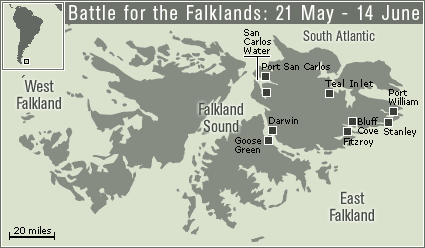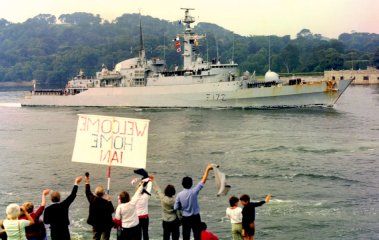30
+ YEARS ON.....
To
our Families:
"What
did you do in the FALKLANDS, Daddy?" (We did not have any Wrens
at sea!). "I was in AMBUSCADE, she was a Type 21 Frigate, the
fastest and sleekest you ever saw, and we were proud of her."
"Yes, Daddy, but what did you do?"
We
had seen it all on TV that weekend: some wanted to go, others would
rather not. Nevertheless from deep in dry dock we stuck the ship back
together again and in some secrecy prepared to embark the heaviest
load ever carried by one of those ships, so big that Naval Constructors
had to work overtime to make sure we did not topple over or break
her back. It was a flightdeck full of ammunition to replenish the
magazines at Gibraltar, emptied by the first wave of the Task Force
in their hurried departure.
We
arrived at Gibraltar on Easter Monday 11 April for 3 weeks Guardship
duties, to be followed by work up and a hectic programme around UK,
saturated by the dearth of ships left by the operation in the South
Atlantic. Guardship we were, but predictably we soon got orders to
go further south to Ascension Island, working up with Portland staff
on the way and quickly adopting warlike habits. Breaking radio silence
in vain to seek professional help, the Doctor, in the Navy only a
few weeks, was the first to meet the challenge: he had to perform
a tricky operation on a hand which had serious blood poisoning, successfully
saving it and possibly the sailor in the process.
We
therefore never said our goodbyes, but you would not know it for all
the enthusiasm everyone had. But the second night out it all became
real when we heard that SHEFFIELD had been hit by Exocet, and over
half of us mustered at the Church service that Sunday.
AMBUSCADE
was a featureless grey by the time we reached Ascension because we
had painted out all distinguishing marks. We did not want to give
the enemy gratuitous information and we had heard there was a submarine
about. Guardship there was also short lived and after briefly enjoying
the delight of meeting ANTELOPE, another of the Type 21 Club, we sailed
south together to join the Task Force on 14 May. Now it was the Flight's
turn to show their mettle in a double engine change, after first making
a forced landing ashore and then repeating their act with the other
engine when they returned on board again!
The
weather had by now begun to challenge us all, sharpening up seamanship,
ship handling and sealegs alike, but none more than the Engineers.
We had to make best speed to get to the Task Force in time for the
landings which were imminent. Our two Olympus engines were fastest
at over 30 knots but were too thirsty, so we had to go flat out at
about 19 knots on the two economical Tyne engines to make the distance
to the next tanker. When a Tyne suffered "catastrophic failure",
therefore, we had problems. First we had to let ANTELOPE go ahead
and lose her Satellite Communications with the outside world, including
the Task Force, but more importantly we would be dangerously low on
fuel before we met the tanker.
We
made the rendezvous with the tanker with half the safety allowance
of fuel left, just upright thanks to the ballast of all the extra
stores low down in the ship. But in the prevailing Force 10 gale the
risk of capsizing became serious, as we were still unable to fuel
because the tanker's rig was defective! After lolling around over
night while the returning SHEFFIELD's crew (sic!) helped to fix the
rig, we had no option but to ballast 20% of our fuel tanks with salt
water and by the time we eventually fuelled we had just 10% fuel left.
By nightfall we were at last on our way again, 80% refuelled and the
Stokers volunteered to scrub out the now contaminated tanks so that
we could top up properly next time. Missilemen, Sonarmen and Electronic
Warfare (EW) experts saved our skins later on but it was the Engineers
that won that early day.
We joined the Task Force on the 21 May, with the landings in progress,
awakened from our "excommunication" by the sound of ARDENT
on HF radio in the heat of the anti-air battle. There was no Exercise
briefing, no massive OpOrder, just copies of signalled shorthand OPGENs
passed to us by EXETER. We fought instinctively from our training,
a tribute to the PWO system and the new Warfare branch. Training was
ongoing, from the Captain down to the most junior sailor and we learnt
new lessons every day. The fortitude of people was remarkable, humbling
trust, no complaints, excitement, bravery, continuous activity and
physical pressure from the weather and fatigue.
We
had learned how much we needed news, and devised new and better ways
to disseminate information within the ship, to keep everyone involved
and to temper the plentiful but sometimes misleading bulletins on
the BBC World Service. We learned to balance the need to be alert
for extended periods with people's physical needs to enable them to
do it. Text book solutions were not always the answer. Morale was
paramount: better to be 90% alert for 100% of the time than 100% for
90% of the time and risk getting caught out. We therefore made strategic
improvements to physical comfort, such as occasionally reinstating
chips on the menu when there was a lull and minimal fire risk from
the deep-fat fryer!
Decisions
had (and have) to be made on the best information at the time, these
days with as much justification written down as possible because afterwards
everyone wants to know why: then, many were to find this out the hard
way long afterwards. Strain breaks through in a minority, however
expert or tough they are, and you have to expect it, recognise it
and know how to deal with it. Peace time practice and procedure did
not prepare us for it then.
Ours
was an exciting war - it was for everyone, but not one that drew much
attention or that many will remember except for us, but that does
not matter. We took part in almost every facet of the campaign, each
was tested and we all owe our lives to the teamwork and spirit of
each individual AMBUSCADE man. Reminiscences are endless: the loss
of ARDENT so soon after our arrival, navigating the unfamiliar narrows
of Falkland Sound for the first time and later the minefield, losing
all but a single engine and limited to a minimum speed of 10 knots,
the night we nearly lost a swimmer of the watch, the two Exocet attacks
when our EW lookouts provided that vital first warning to the fleet,
the noise level in Ops room during the first attack, the silence after
our own escape as we searched for the casualties of ATLANTIC CONVEYOR
instead.
Twice
the Sonarmen found and chased the submarine lurking under the force
hoping for a shot at INVINCIBLE (enemy torpedo HE does not sound like
a flatulent whale!), night after night the Missilemen fired hundreds
of rounds on Naval Gunfire Support (NGS) missions with precision,
boats crews picked up urgent supplies from air drops, the aviators
flew special forces ashore, the Weapons Engineers stayed up all day
to keep the 4.5" gun serviceable, others would be up all night
replenishing stores from a storeship - all in heavy seas, with stabilizers
long since broken and in conditions quite unacceptable in peacetime.
And, having won our spurs in those first few days, we always had to
rush back to take up our daytime EW picket station on the screen.
Built for NGS, able to engage two targets at once, the climax came
on the night of the final advance on Port Stanley when we fired 228
rounds (6 tons of HE) in support of 2 Para, taking out two gun emplacements
along the way.
While
serious, the later notorious cracks in the ship's frame and the criticism
of aluminium did not bother us. We had to live (carefully) with the
cracks in those horrendous seas, but we later blessed the aluminium
because it gave us our acceleration, high speed and endurance, and
enabled us to be better armed and equipped than any other ship of
our size. A brief word is always difficult, but perhaps the odd story
may stir one or two to remember what was achieved. This was the sailor's
war and AMBUSCADE did indeed do her bit.
"Yes
son, that's what I did. We fought a good war; we returned safely and
I'm proud of it!".
P J Mosse
CDR Peter J Mosse Captain HMS Ambuscade January
1982 - September1983 My Falklands
photo selectionr )


